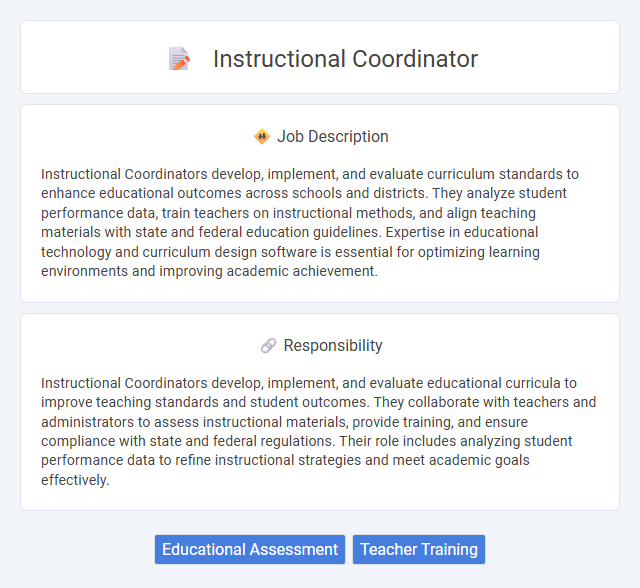
Instructional Coordinators develop, implement, and evaluate curriculum standards to enhance educational outcomes across schools and districts. They analyze student performance data, train teachers on instructional methods, and align teaching materials with state and federal education guidelines. Expertise in educational technology and curriculum design software is essential for optimizing learning environments and improving academic achievement.
Individuals with strong organizational skills and a passion for improving educational programs are likely to thrive as Instructional Coordinators. Those who enjoy collaborating with teachers, analyzing curriculum effectiveness, and implementing instructional strategies may find this role suitable. Candidates who prefer routine tasks or minimal interaction might face challenges in this dynamic, interactive position.
Qualification
Instructional Coordinators typically require a master's degree in education, curriculum and instruction, or a related field, alongside several years of classroom teaching experience. Strong knowledge of curriculum standards, educational technology, and assessment methods is essential for developing effective instructional materials and training programs. Certification in instructional design or educational leadership often enhances career prospects in this role.
Responsibility
Instructional Coordinators develop, implement, and evaluate educational curricula to improve teaching standards and student outcomes. They collaborate with teachers and administrators to assess instructional materials, provide training, and ensure compliance with state and federal regulations. Their role includes analyzing student performance data to refine instructional strategies and meet academic goals effectively.
Benefit
Instructional Coordinators likely improve educational quality by developing effective curricula and teaching standards, which can enhance student outcomes and teacher performance. They probably support professional development, leading to more skilled educators and increased job satisfaction. This role may also offer competitive salaries, job stability, and opportunities for career advancement in the education sector.
Challenge
Instructional Coordinator roles likely present challenges in adapting curriculum to diverse student needs while ensuring alignment with educational standards. Managing the integration of technology and training staff to effectively implement new teaching methods may also pose significant difficulties. These challenges require strong problem-solving skills and continuous professional development to optimize student outcomes.
Career Advancement
Instructional coordinators play a pivotal role in enhancing educational programs by developing curricula and training educators, positioning themselves for leadership roles in academic management. They often advance to senior instructional designer, education director, or curriculum specialist positions by gaining expertise in educational technology and data-driven teaching methods. Pursuing certifications in instructional design and education administration significantly boosts opportunities for career growth and higher salaries within the education sector.
Key Terms
Educational Assessment
Instructional Coordinators specializing in educational assessment design and implement evaluation tools to measure student learning outcomes and instructional effectiveness. They analyze assessment data to develop targeted strategies for curriculum improvement and teacher training. Expertise in standardized testing, formative and summative assessments, and data-driven decision-making is crucial for optimizing academic performance across diverse educational settings.
Teacher Training
Instructional Coordinators specializing in teacher training design and implement professional development programs that enhance educators' instructional skills and align with curriculum standards. They analyze educational trends, evaluate teacher performance, and provide targeted coaching to improve teaching strategies and student outcomes. Expertise in curriculum design, data-driven decision-making, and adult learning principles is essential for optimizing teacher effectiveness and fostering continuous improvement in schools.
 kuljobs.com
kuljobs.com